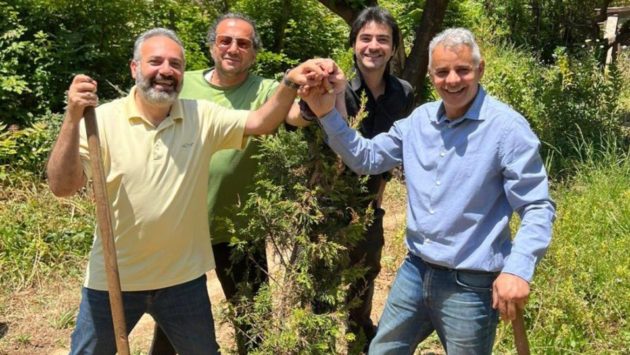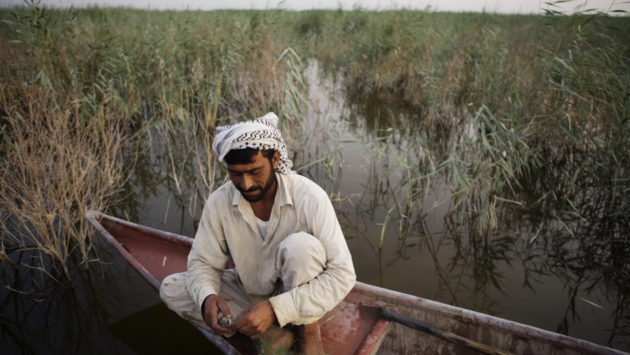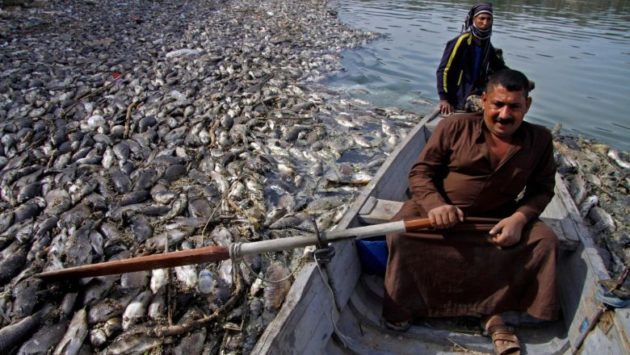Environmental and governmental organizations demand the revitalization of the Marshlands
Al-Mada Press / Dhi Qar
Environmental and governmental organizations warned on Thursday of the deteriorating environmental situation in the Iraqi Marshes, as a result of the lack of water release upstream. Causes of the current drought in the Marshes were attributed to “the poor management of water resources in the basins= of the Tigris and Euphrates and the lack of release of Euphrates water and Daesh control of several dams”. The organizations called for urgent adoption of a contingency plan and the formation of a permanent crisis cell in order revive the Marshes.
A joint statement issued by the Development Center for Energy and Water and the Nature of Iraq Organization and the Mayor of Chabaish District “Badi Lebanon” stated that: “The drought crisis of the Marshes in Southern Iraq began six months ago and it still ongoing due to the continued lack of water flows, damaged ecosystem and biodiversity, as well as an imminent collapse of the food chain system”.
The statement added that “what is happening now reminds us of the turbulent nineties of the last century, when the Iraqi Marshes were almost completely drained”, pointing out that “the share of water for the Marshes of Southern Iraq from both Hindiya and Kut Dams is very poor, and does not go beyond what is planned in a study (“Sorley”) which was endorsed by the Ministry of Water Resources. “
The statement considered what is happening now “a major challenge for the ability to re-submerge the marshlands” stressing that “this requires the fulfillment of international commitments by announcing the locations of Ramsar in 2007 and 2015”.
The organizations stressed through the statement, that “the file of the Marshes is still under study by UNESCO experts for inclusion in the World Heritage List” calling those in charge of water and environmental management in Iraq to “improve the current situation of the Marshes and overcome the failures of the past before it is too late”.
The statement called for “the adoption of an urgent emergency plan and the formation of a permanent crisis cell consisting of representatives of the local population, and to followup on recommendations set by international organizations.”
The governor of Dhi Qar, Yahya Mohammed Baqir Al-Nasseri, designated on 1 June 2015 the Marshes south of Nasiriyah as a disaster area, after it was exposed to drought as a result of water shortages and decrease of Euphrates river level. He called upon the federal government and international organizations to put pressure on Turkey to release water to the rivers that feed marshlands. He also confirmed recording large numbers of chicken pox infections and the deaths of large quantities of fish and livestock.
The Marshes’ area in Nasiriyah represents 1/5 of Dhi Qar area (350 km south of Baghdad), and consists of 10 administrative units out of 20 included in the province. The area of Al-Nasiriyah Marshes was estimated at one million and 48 thousand acres before it was drained in the nineties, while the area which has been flooded with water after 2003, was about 50 percent of the total area of the Marshes of Nasiriyah.
The Iraqi Marshes are facing a number of problems, most notably fluctuation of water levels and lack of basic services as well as inadequate provision to livestock. The Marsh Arabs are wellknown for raising buffalo, fishing and birds. However, herds of buffalo’s are often exposed to epidemics and diseases that lead to a large number of deaths, which in turn means a great loss for the population.





